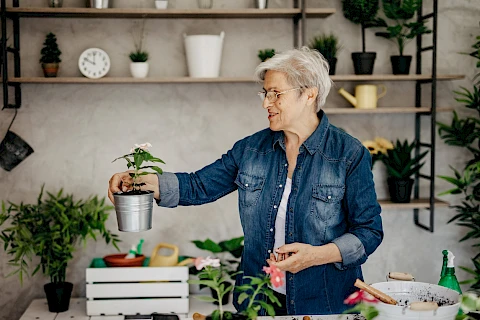
Winter can be a challenging time for seniors. With limited outdoor activities, staying engaged and active indoors becomes essential. One wonderful activity to consider is indoor gardening. Not only does it provide mental and physical benefits, but it also brings a bit of nature indoors. Indoor gardening can be a delightful way to brighten up the colder months and maintain overall well-being.
Choosing Suitable Plants
Selecting the right plants is the first step to successful indoor gardening. Choose plants that are easy to care for, especially for seniors who may not have prior gardening experience. Some great options include pothos, spider plants, and peace lilies. These plants are ideal for beginners and can thrive in various indoor conditions.
Consider low-light plants that don't require direct sunlight since many homes have limited natural light during the winter. Snake plants and ZZ plants can flourish in such environments. When choosing plants, consider personal preferences and any physical limitations. For example, if lifting heavy pots is difficult, choose smaller plants that are easier to manage.
Basic Care Instructions
Once you've chosen the right plants, it's important to know how to care for them. Ensure plants are consistently watered but not overwatered. Checking if the top inch of soil is dry is a good rule of thumb.
Position plants in an area where they'll receive adequate light, keeping in mind each plant's specific needs. Regularly feed plants with a diluted fertilizer designed for indoor plants, especially during growing months.
Establishing a simple routine can make plant care easy and enjoyable. Encourage seniors to check on their plants daily, looking for signs of distress like wilting or yellowing leaves.
Benefits of Indoor Gardening for Seniors
Indoor gardening offers several benefits that enhance seniors' quality of life. It can have a significant positive impact on mental health by reducing stress, improving mood, and providing cognitive stimulation. Many seniors find joy in nurturing plants and seeing them grow.
Physical health also benefits from gardening activities. Tasks like planting and watering offer gentle exercise and can improve dexterity and coordination. Even simple actions like pruning can keep fingers nimble.
Moreover, indoor gardening can foster social connections. It can be a shared hobby between seniors and caregivers or among peers, leading to increased interaction and collaboration. Gardening together creates opportunities for meaningful communication and bonding.
Adapting Gardening Activities for Different Ability Levels
Tailor gardening activities to suit different ability levels. For seniors with limited mobility, consider using raised planters or tabletop gardens to avoid bending or kneeling. Encourage activities that match their comfort level and physical capability. Seniors should always consult with a doctor before starting a new fitness routine.
Adaptive tools with ergonomic handles can make tasks more accessible for those with arthritis or grip challenges. Simple adjustments like lighter watering cans can ease the burden of watering.
Group activities, like creating a shared indoor garden space, can encourage participation and create a sense of community. Collaborative projects also offer opportunities for seniors to learn from each other and enjoy a shared sense of accomplishment.
Growing Joy Indoors This Winter
Indoor gardening is a joyful and beneficial activity for seniors, especially during winter. It provides mental, physical, and social advantages that contribute to overall well-being. By choosing suitable plants and adapting activities to individual needs, caregivers can offer a rewarding experience that enhances seniors' lives.
If you're interested in bringing the joys of indoor gardening to a senior in your life, contact us at Senior Helpers North Metro. We're here to provide senior care, support, and guidance in Andover, Anoka, Champlin, Circle Pines, and Minneapolis. Start a new indoor gardening adventure this winter and witness the happiness it brings!